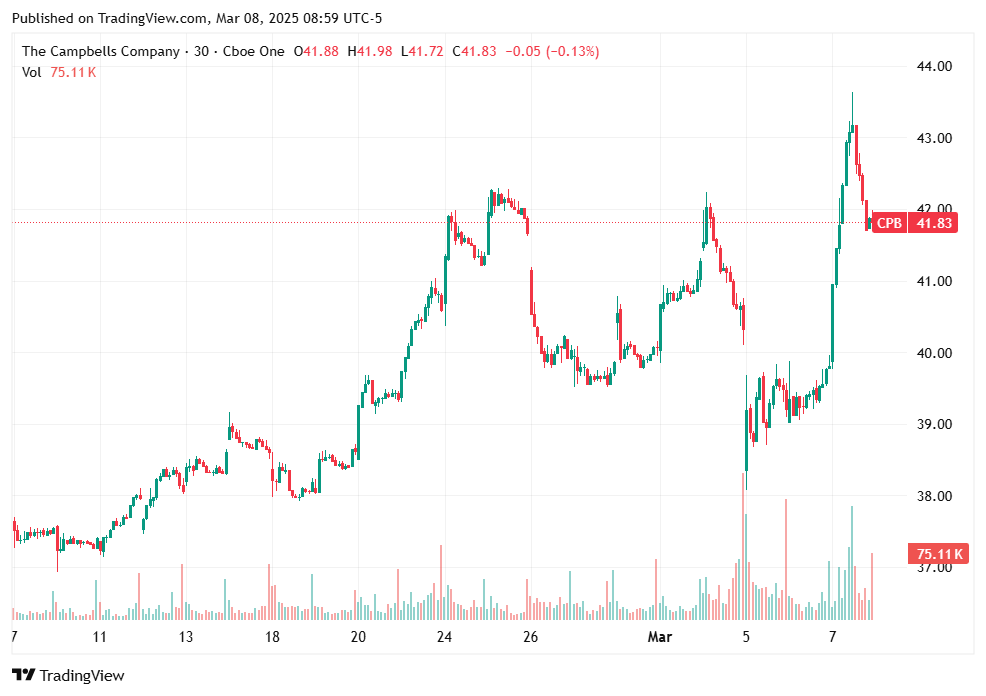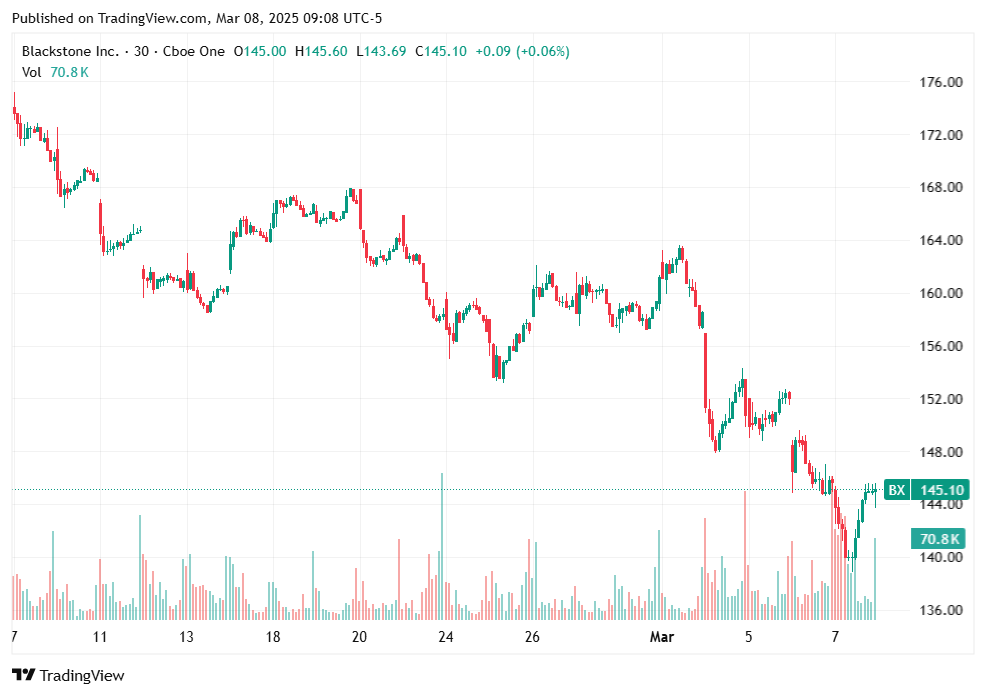Jared Dillian: "Your Intl Allocation Needs to Be Much Higher Than 10%"
The Daily Dirtnap author on why we're going to get more than 3 rate cuts, why we should expect a "face-ripping rally," and why the US -> International trade will last years
It was an ugly week for stocks, with a news cycle in hyperdrive. We wrapped up the week with
, author of The Daily Dirtnap, who was as cool, calm, and no B.S. as ever:What’s Happening Now
Jared is bearish on stocks, and he isn’t really trading them at the moment (though he has a number of long-term positions). “I think the trend has been broken,” he said. So now we’re going to get lower highs and lower lows.”
That said, in the super short term he thinks “we’re getting a little bit oversold” and that “at some point, there’s going to be a face-ripping rally.”
What’s happening right now, he said, is a rotation out of tech and into other stuff.
“I saw some interesting charts of some staples today, Campbell’s Soup (CPB - below) and Procter & Gamble), they’re going parabolic,” he said.

“It’s de-risking. You’re seeing money coming out of riskier tech stocks, going into other stuff, and more importantly, going overseas.”
Another area Jared flagged was private equity, which is “really getting annihilated in this sell-off,” he said. “Blackstone (below) is down like $10 this week. KKR, TPG, they’re way down from the highs.”

🪢JD’s been on top of the short private equity trade for a while.
Before we get into why money’s going overseas and where it’s going overseas, is it a complete capital reversal out of all US assets?
“Not necessarily,” Jared said. “I think really the implications are more for FX. There is a pretty strong correlation between the dollar and the rest of the world’s equity valuations. So yes, capital is going to flow into international stocks and those capital flows are going to determine FX valuations. The Euro is 1.08 right now - it’s for sure going to 1.10, 1.12. If you wanted to take a vacation to Europe, you should have went over the summer. It's too late.”
❗Rates Outlook
“I typically look at the front end of the curve. I've been a short-term rates trader my whole career going back to when I was doing index arb,” Jared said. “And when I look at 2-year notes at 3.9%… We have 3 rate cuts priced in for 2025. We’re going to get more than 3. I would bet anything on that. We’re going to get 4, 5, 6.”
💡”And if you believe that's going to happen, front end of the yield curve is a screaming buy,” he said.
Why It’s Happening
The catalyst, Jared says, has been the tariffs. “The thinking was that tariffs would make the dollar stronger and that they would be inflationary,” Jared said. “Here’s the interesting behavioral finance aspect to this. If you put a 25% tariff on a car and it goes from 50k to 60k, you’re just not going to buy the car, and economic activity slows down. Some people have been saying this for a while. Art Laffer actually put out a piece earlier this week saying that tariffs were deflationary. It is absolutely true.”
🪢Jared talked more about this with in The Macro Dirtcast this week.
“Ultimately, I think Trump is kind of playing 3D chess,” Jared said. “I think his goal with the tariffs is is to eliminate foreign tariffs on US goods - like, ‘okay, we're going to put reciprocal tariffs on you, then you get rid of your tariffs, then we get rid of our tariffs, then we have no tariffs.’ I think that's the goal, but it’s bad for stocks, it's bad for the economy, it's bad for sentiment in the short term.”
And as for the fact that President Trump has said he’s not looking at the stock market? Jared - well, Jared doesn’t believe that (if we were bigger on emojis around here, this would be the place for the ‘crying laughing’ one):
“If stocks went down 20% and a narrative developed that tariffs were responsible for it, I think we wouldn't have tariffs,” he said.
In addition, Jared still thinks Scott Bessent is going to engineer the dollar lower. “The dollar is as overvalued as it was in 1985 when they did the Plaza Accord,” Jared said. “I’m not saying we’re going to have another Plaza Accord, [but] if we’re going to have tariffs and the deflationary aspect of tariffs, we need to engineer the dollar lower to offset that.”
💡And what that means for the US → International trade is, “This is not a one week trade,” Jared said. “It’s going to last for a while - multiple years. So if you're talking about this from an asset allocation perspective, if you go to a [broker] and they say ‘you should have 70% of your stocks in domestic and 10% in international,’ your international allocations should be much higher than 10%. Ideally it would have been higher a couple of weeks ago, but it has to be higher now.”
Where It’s Going: The Make Europe Great Again Trade
Jared thinks there’s some kind of big factor trade going on regarding European stocks. A quick definition of factor investing from iShares:
Factor investing is the strategy of targeting securities with specific characteristics such as value, quality, momentum, size, and minimum volatility. Factors are persistent and well-documented characteristics that can help investors understand differences in expected return.
“Some of these really, really deep value stocks in Europe, like these piece of crap steel stocks are up like 100% in a week,” Jared said. “My guess is, is that quant hedge funds as a group were short European value stocks and long US tech stocks. And they had that on as a pairs trade. And then it starts to unwind, and there's not a lot of liquidity in the European value stocks. So they go up 100% and then it turns into short covering. That's when factors really start to move - when it's crowded and people are trying to get out.”
💡”If you're in the business of managing money… they have to be in the trade that works,” Jared said. “The Mag 7 versus European value stocks trade has been working for 20 years. You can get really comfortable in a trade like that - it just works forever, until one day it doesn’t.”
But just because there may be a factor trade happening right now, doesn’t take away from the bigger European picture. There’s this:
“This week, you had a 3 standard deviation move higher in the Euro,” Jared said, which is an enormous move. “The dollar just collapsed this week, mostly against the Euro.”
And there’s also this:
"You've had a big backup in European bond yields because now Europe is theoretically going to be paying for Ukraine,” he said. “So their deficits are going to be up, going to be up. So their bond yields are backing up, which makes the euro stronger.”
And the tariff implications JD discussed.
Where It’s Going: The Rest of the World
“It’s Europe, but it’s [also] the rest of the world in general,” Jared said. “I mean, the US is trading at around 23 times [earnings]. Europe is trading at 9 or 10. Latin America is at 6, China is at 6. And what I’ve been saying in The Daily Dirtnap, going back at least 6 months, is that one of these days, these valuations are going to matter.”
Latin America
Trading At: Around 6 times earnings
What’s Happening: Political change, mainly. “Latin America has had a 100 year history with leftist politics, and now Argentina’s Milei revolution is spreading to the rest of Latin America,” Jared said. “I think Latin America writ large is moving to the right economically. I think Latin America is a huge opportunity over the next five years.”
Specific Countries: “Colombia is ripping, Peru is really cheap, Chile is really cheap… If Brazil got rid of Lula, Brazil would be probably the best opportunity in the world.”
Asia
Jared’s take on:
Japan: “Japanese stocks are a little expensive.”
China: “Still a disaster.”
South Korea: “A basketcase.”
India: “I have had a big position in India for a little over a year. It had a big run-up, and has had a bit of a correction, [because] China ripped, and people used India as a source of funds. But India for the long term, 5-10 years, I’ll take it.”
Canada Update
Last time Jared was on Talking Markets, he shared his Long Canada thesis. Basically, he said, “Anytime you have a country that is economically unfree, and it suddenly becomes free, you have explosive growth.” So the thesis was that with the resignation of Justin Trudeau, and Pierre Poilievre the favorite to be the next Canada PM, Canada could be the next Argentina — in terms of pro-business reforms, at least.
Here’s what he said in January would change his mind:
And that’s playing out a little bit: “Mark Carney entered the race, and that changed everything,” he told us yesterday. “They're running basically neck and neck. I still think Pierre is going to win, [but] I don't have the confidence in that to take a full position in EWC. So the situation has changed. I put it on the back burner for now. The election's going to be in the fall, I'm basically just waiting at this point.”
So Just Chuck $ Into Intl ETFs? Not Quite…
“When people think of investing in emerging markets, they think of EEM or VWO - those are the big emerging markets ETFs,” Jared said. “I don’t like them. Back in the 2000s, when you had this big bull market in EM like the BRICs - they had a lot in common. They had population growth, technological development. But now when I look at emerging markets, you can’t generalize about them. They’re very idiosyncratic.”
💡“So if I’m going to invest in EM, I just do it in the country ETFs,” he said.
And Let’s Finish With a Ding
That’ll make sense in a second:
To watch the full episode, right this way.
Enjoy,
Maggie
Important Disclaimer: It is crucial to remember that this article is for informational purposes only and should not be considered investment advice. Consult with a qualified financial advisor to assess your risk tolerance, investment goals, and overall financial plan.






Why do so many in finance/investing think Trump is playing 3D chess when it comes to tariffs? He tried to punish China in his first term... they retaliated and we had to bail out our farmers with billions of taxpayer dollars. Consider that already he has imposed tariffs on our neighbors twice, backing down immediately for border enforcement deals that were already in place, and because the auto industry told him the tariffs would destroy them and the stock market began to crash.
There is no 3D chess... he has had an obsession with tariffs since ~1980. He thinks other countries pay tariffs (US consumers do), thinks it will bring back US manufacturing (ship has mostly sailed), and tariffs will help reduce our deficit (perhaps a bit, on the backs of lower & middle class). I think he hears the word deficit and thinks it's bad, but it simply means we import more than we export and it's not necessarily bad. Tariffs are a tool to be used with strategy and precision to protect American business and interests, not bombs to drop indiscriminately to ensure everyone loses.
The guy was a TV celebrity and a horrible businessman who filed for bankruptcy countless times, including running a casino into the ground. No 3D chess. He's just incompetent and unwilling to listen to any advisors who have the courage to speak truth to him. Typically the simplest explanation is the correct one.